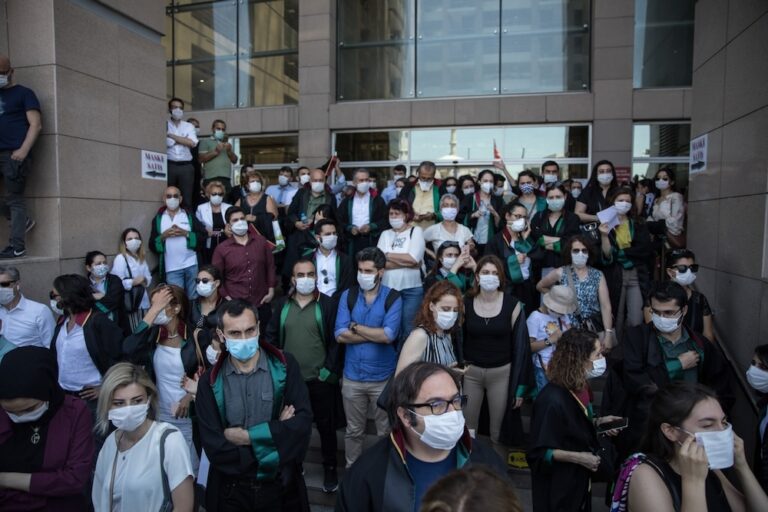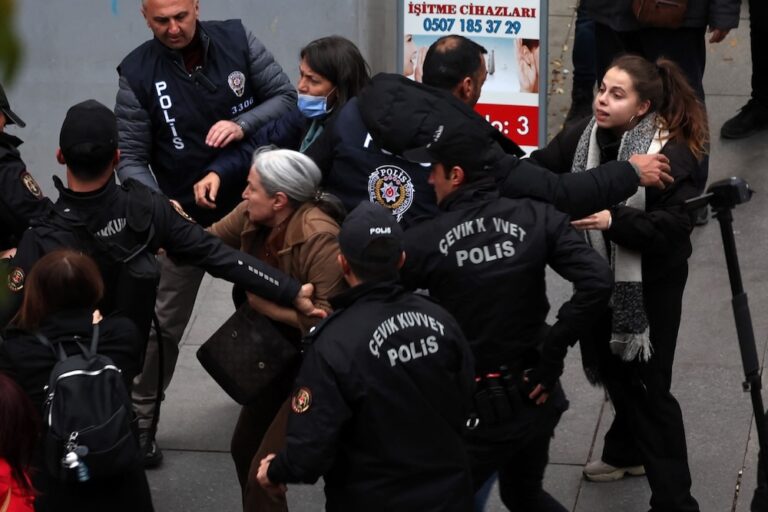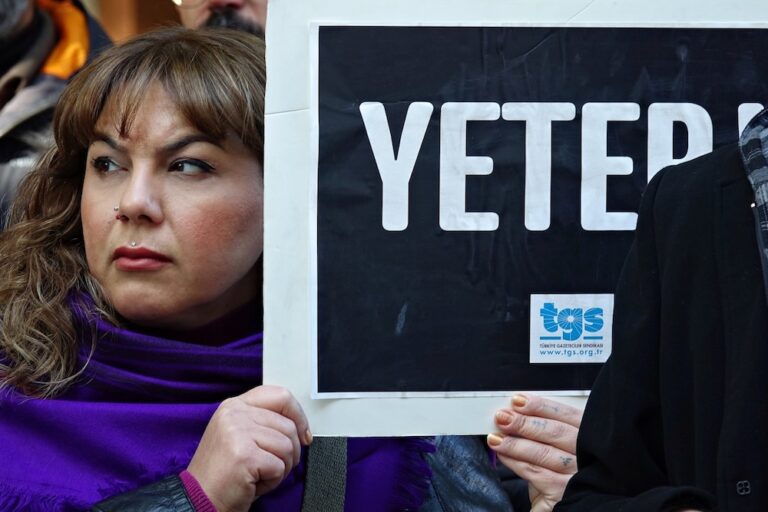(RSF/IFEX) – The following is a 5 February 2002 RSF press release: New bill to increase penalties for press crimes In a letter to European Union Commissioner Gunter Verheugen, who is responsible for the Union’s enlargement, Reporters sans frontières (RSF) denounced the Turkish parliament’s introduction of a bill that would amend legislation punishing press crimes. […]
(RSF/IFEX) – The following is a 5 February 2002 RSF press release:
New bill to increase penalties for press crimes
In a letter to European Union Commissioner Gunter Verheugen, who is responsible for the Union’s enlargement, Reporters sans frontières (RSF) denounced the Turkish parliament’s introduction of a bill that would amend legislation punishing press crimes.
“On the pretense of introducing reforms that were requested by the European Union, the government is widening the number of press crimes that are punishable by law. It is absurd, but this has become a constant of the Turkish authorities’ human rights policies. On the one hand, general commitments are made vis-à-vis the European Union in the context of Turkey’s application to join the partnership. On the other hand, all possible means are being implemented to control freedom of expression even further,” stated Reporters sans frontières Secretary-General Robert Ménard. “We ask that you send a clear signal to the Turkish authorities indicating that these bills are unacceptable,” Mr. Ménard added in his letter to the European Union commissioner.
Further to the October 2001 consititutional amendments, which the Turkish authorities introduced in an effort to improve relations with the European Union, the authorities undertook to amend the Penal Code articles that concern the press. Yet the proposed amendments that were unveiled on 24 January actually costitute a toughening of the legislaion. The proposed bill is scheduled to be introduced shortly, even though it has been met with strong opposition.
Article 312 of the Penal Code punishes “incitement to hatred and hostility by means of discrimination”. The amendment bill introduced by the authorities on 24 January considers the “probability” of incitement to racial hatred as a crime and includes “insulting peoples’ honour” and “insulting a segment of the population” as new charges, punishable by six months to two years’ imprisonment with no parole.
Article 159 of the Penal Code punishes “mockery and insults against state institutions” by a one to six year prison sentence with no parole. Though the new version of Article 159 reduces the maximum sentence to three years’ imprisonment, it expands to include anyone who insults “Turkishness”, the Turkish nation, the Turkish state, Parliament, the Council of Ministers, ministries, courts, the armed forces and security forces, as well as their soldiers and officers. Merely implicating any of these institutions is also punishable by the same sentence.
Articles 7 and 8 of the Anti-terrorist Law punish “terrorist organisations’ propaganda” and “separatist propaganda”. The bill includes provisions to increase the scope of Article 7 of the Anti-terrorist Law to include “terrorist organisations’ propaganda via incitement of the use of terrorist means”. Article 8 aims to punish “written, visual or verbal propaganda, via meetings, demonstrations or marches, by a one to three year prison sentence and a fine of one to three billion Turkish liras (902 euros). The bill also stipulates that if the propaganda constitutes an incitement to commit terrorist acts, the prison sentence cannot be converted to a fine.
Reporters sans frontières recalls that over fifty journalists were tried in 2001, in accordance with the following articles:
Erol Özkoray, founder and editor-in-chief of the quarterly mgazine Idea Politika, is still being prosecuted in accordance with Article 159 of the Penal Code, for “insulting the army” and “insulting the Republic”. In several articles, he analysed the Turkish army’s influence within institutions, its omnipresence in politics and its economic weight. He came to the conclusion that the army is obstructing the democratisation of the country, which is a candidate for European Union membership. The charges against him were dismissed for lack of evidence during his first trial, which opened on 9 November 2001. Five other suits were launched against him, one of which followed the publication of an interview with Reporters sans frontières Secretary-General Robert Ménard, who evoked the Turkish regime’s “schizophrenia.” The second trial’s first hearing is scheduled for 4 April 2002.
On 13 February 2002, Aram Editions senior manager Fatih Tas will appear before Istanbul’s State Security Court No. 3, in accordance with Article 8 of the Anti-terrorist Law, because he published an anthology of articles by linguist and political analyst Noam Chomsky on the subject of the Kurdish problem, titled “American Interventionism”, in September 2001. Noam Chomsky is expected to attend the hearing.
Nese Düzel, a journalist from the opposition daily Radikal, is accused of “inciting hatred through religious discrimination”, in accordance with Article 312. This follows her 8 January 2001 interview with Murtaza Demir, president of an Alevis community association whose members are known to be progressive Muslims. The journalist has already been heard by the judge three times.
On 15 February, Celal Baslangiç, a journalist from Radikal, and Iletisim Editions senior manager Osman Tuna will make their second appearance before Istanbul’s Sultanahmet Second Court of Assizes because they published the book “The Temple of Fear”. The book was seized by the judicial authorities as soon as it appeared on the market in August 2001. Both individuals are accused of “mockery and insults against the Turkish armed forces”, in accordance with Article 159.
Fikret Baskaya, an editorial writer from the pro-Kurdish daily Özgür Bakis and academic, has been imprisoned in Ankara’s Kalecik prison since 29 June 2001. On 26 January 2001, the Cassation Court confirmed his sentence of one year and four months’ imprisonment and a fine of 1,066,000,000 Turkish liras (855 euros). Baskaya’s sentence for “separatist propaganda” was originally passed by the State Security Court, in accordance with Article 8 of the Anti-terrorist Law. In an article titled “Is it a Historic Trial?”, published in the daily Özgür Bakis on 1 June 1999, the editorial writer wrote that “Turkish leaders have always considered the Kurdish problem to be one of public order, when it is in fact a national problem. They thought they could resolve the problem by enforcing a chauvinist, racist and nationalist policy.”


